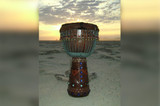What’s the Best Instrument for All Ages? Shakers, of Course!
We don’t want to toot our own horns, but, we’re pretty smart when it comes to drums and percussion. We love the smiles and fun that a drum can bring into the mix and the unstoppable benefits of rhythm for the brain. We support music education for all ages (you’re never too old to groove!) and as advocates for drums and rhythm, we’re often asked what the best instrument is to tie it all together and make some noise, from preschool through the golden years.
Well, drums, of course… djembes, bongos, cajon drums. Drum sets. Frame drums. Bucket drums. We’re all about the drums, but, there’s another, often overlooked percussion instrument that can provide the same kinds of benefits (and fun!), and is much more accessible for everyone: the shaker.
That small, often egg-shaped percussive afterthought is actually more of a gateway instrument for anyone interested in rhythm. Shakers are heard in all different types of music and venues, including therapy and classroom settings. They’re perfect for anyone who wants to dabble in rhythm games and activities, or for the professional musician who wants a way to really shake things up.
Because shakers are awesome.
Shakers come in all different styles and shapes, and are a great way to teach the history of different countries while introducing rhythm games and activities. Modern shakers are often found in different shapes of metal or plastic filled with plastic beads or other materials, but, there are also shakers from Africa, Latin America and other cultures that are crafted from natural resources like gourds, rawhide or turtle shells. Classrooms can use the “natural” types of shakers as a lesson in engineering and evolution of design (think STEM education):modern maracas, for example, are evolutions of the gourd version of the same instrument.
Shakers are made for the hand, so they are much more portable and take up less space than other drums or instruments. The size of shakers makes them easy for anyone to use, from the smallest, preschool-sized hands to the wise hands of our own grandparents.
Shakers are quiet in comparison to drums and other instruments. Noise can be a factor in a normal house where the pounding of drums is an unwelcome form of torture for parents or neighbors. Noise can also be too hard on anyone with sensory issues. Shakers have sound, yes, but it is a much quieter way to learn and express rhythm.
Shakers don’t cost a lot for anyone to buy. Music teachers, drum circle facilitators or even community program managers can pick up a bunch of shakers with very little strain on the budget.
Shakers can be homemade, and there’s a lot of lesson-making in that process, too. Early childhood crafts like making a shaker are also surprisingly easy for the older generations, or those with mobility issues. Plus, first you make it, and then you shake it!
Shakers teach rhythm in ways that drums cannot, which can benefit anyone who doesn’t feel the call to drum, but, still wants to groove with a beat.Shakers teach timing, emotion, and different ways to make sound depending on how the instrument is shaken, tapped or otherwise played.
If you think about it, a quick shake of a shaker at a music store can be just as satisfying as a quick tap on a drum head as you walk by. This tiniest of percussion instruments can have a big effect in the world of rhythm, and they (like many other percussion instruments) offer more than a way to keep time. Shakers are fun inventions with historical context that are loved by professional musicians, kids and people around the world. Get out there and shake ‘em!
Recent Posts
-
What is the Best Size Djembe for Beginners?
If you're new to the world of percussion and interested in learning the djembe, you're in for a t …16th Jul 2024 -
The Benefits of Becoming a Drumming Teacher: Transforming Passion into Profession
Why become a drumming teacher? Becoming a drumming teacher is an excellent way to share your pas …22nd May 2024 -
What Makes the Djembe Drum a Spiritual Instrument in African Music?
Origin and history of the Djembe drum The Djembe drum originates from West Africa and holds sign …16th May 2024



